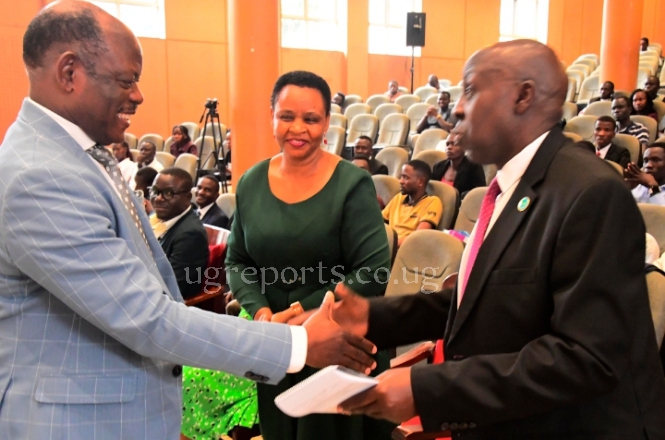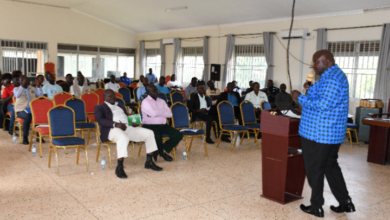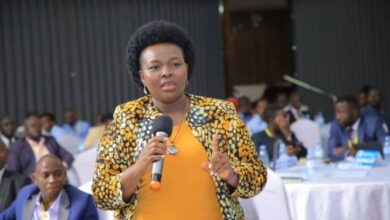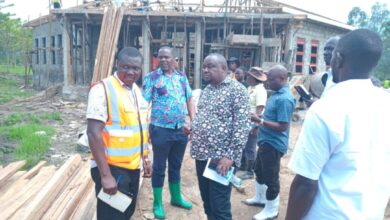Youth tipped on fighting corruption
“As much as you blame the government, what have you done to ensure that corruption is fought? Each one of us has a role to play.”

Kampala: Brig. Gen. Henry Isoke, the head of the State House Anti-Corruption Unit, has urged Ugandan youths to take responsibility in fighting the pressing issue of corruption.
According to Brig. Gen. Isoke, the youths should reflect on their own contributions towards the fight against the vice.
“As much as you blame the government, what have you done to ensure that corruption is fought? Each one of us has a role to play.”
The Anti-corruption head made the remarks today during the launch of the National Students Participation in the Fight Against Corruption program, at Makerere University.
The dialogue, organised under the Office of Makerere University Guild President, focused on youths and students’ perspectives on the cost of corruption in social and economic transformation.
The event ran under the theme: “Universities Without Walls: Revolutionising University Institutions as the Engine for Transformational Sustainability”.
As the chief guest, Brig. Gen. Isoke emphasised that President Yoweri Kaguta Museveni has consistently addressed corruption in his speeches and has established various institutions to combat the vice.
“The President has set up well-thought-out institutional frameworks and encouraged the enactment of several laws,” he explained.
“We have an institutional legal framework to fight corruption. If you question what the government has done, remember to also consider what institutional and legislative frameworks have been implemented,”he noted.
Gen. Isoke also urged the youths to be more analytical and independent rather than merely reactive activists.
“As intellectuals, you must study policy and not just run around with negativity. Be independent and analytical.”
He also stressed the importance of patriotism in achieving socio-economic transformation, explaining that this can only be achieved through Ugandans loving their country.
“Appreciate and get concerned about your country. Corruption is a concern for everyone.”
Gen. Isoke highlighted the challenges faced by anti-corruption efforts, noting the overwhelming number of complaints received.
“The Anti-Corruption Center receives between 150 to 200 complaints per day. Since its inception, we have handled 687,108 complaints. Out of these, 617 accused persons have been arraigned in court, including 310 civil servants.”he said.
“We have convicted 102 individuals, including 64 public officers and 58 private individuals,” she said.
Gen. Isoke further underscored the need for continued efforts and adherence to policy,saying that there is a lot of goodwill and complementary effort from the government.
“However, the solution lies in policy, mandate, and responsibility. Corruption starts with me and you.”
He also warned the youth against being manipulated by those with ulterior motives.
“Don’t accept to be used as pawns. There are issues you can resolve without violence. Be aware that some demonstrations are manipulated by individuals with their own agendas,” he urged.
Gen. Isoke further emphasised the importance of intellectual dialogue and rigorous analysis.
“As university students, it is crucial to engage in analytical thinking and avoid being unduly influenced by social media. Let’s reserve social media discussions for that platform and rely on substantial evidence and thorough research for academic discourse. We must uphold the intellectual standards that Makerere is renowned for,” he stressed.
Brig. Gen. Isoke also expressed gratitude to the guild leadership and Col. Edith Nakalema, the head of the State House Investors Protection Unit for facilitating the event.
“I want to thank the guild leadership, who worked closely with Col. Nakalema to make this interaction possible. Her vigilance and efforts in bringing this to my attention along with involving some representatives were greatly appreciated,” he said.
Concluding his remarks, Gen. Isoke highlighted the progress Uganda has made despite the challenges posed by corruption.
“The country has achieved significant security improvements, with increased life expectancy and a growth in industries from 80 in 1980 to about 8,000 now. The youth have a crucial role in continuing this progress.”
On the other hand, Col. Edith Nakalema, emphasised the youth’s crucial role in rebranding the nation through collective efforts to combat corruption and unemployment.
Col. Nakalema highlighted the significance of youth involvement, quoting George Bernard Shaw, one of the founders of the London School of Economics who once described poverty as “the greatest of evils and the worst of crimes,” underscoring the need for proactive engagement in national development.
She said, “Our President consistently teaches every able-bodied Ugandan to get involved in efforts to enhance their welfare.”
“From my experience working with H.E. President Museveni, it is clear that one of his key teachings is for every Ugandan to actively contribute to improving their own welfare. What are you, as able youthful citizens, prepared to do to further transform our country?” Col. Nakalema inquired.
Col. Nakalema also stressed the importance of unity among the youth to address unemployment and corruption, encouraging them to become co-creators of wealth and promoters of national prosperity.
She further praised President Museveni’s commitment to youth empowerment, noting recent appointments of young leaders to key ministerial positions.
“These include Hon. Lilian Aber as Minister of State for Disaster Preparedness, Hon. Phiona Nyamutoro as Minister of State for Energy, Hon. Peter Ogwang as Minister of State for Sports, and Hon. Balaam Barugahara as Minister of State for Youth and Children Affairs,” she noted.
Col. Nakalema highlighted the importance of adhering to four guiding principles for national development: Patriotism, Pan-Africanism, socio-economic transformation and democracy.
She urged the youth to prioritise these values as they work towards collective progress.
Col. Nakalema also addressed the demographic challenge posed by Uganda’s recent census results, which show that 78% of the population is under 35, and 44.4% are dependents.
She called for a concerted effort to address this dependence and foster economic self-reliance. She urged youth leaders to reject negative influences and remain focused on constructive activities.
“We appreciate the organizers of this dialogue and commend those who will continue to engage in discussions that drive national transformation,” Col. Nakalema said.
Prof. Barnabas Nawangwe, the Vice Chancellor of Makerere University, underscored the importance of intellectual debate in combating corruption, emphasising that the issue extends beyond mere office settings and starts with a mindset.
Prof. Nawangwe highlighted Makerere University’s prestigious standing as a leading institution for black students globally.
“Makerere is not just a historically significant university but a beacon of innovation and excellence,” he stated.
He pointed out that the university’s achievements, such as being the first African institution to develop an electric car, underscore its global reputation.
Prof. Nawangwe urged students to leverage their intellectual capabilities to tackle the problem of corruption. He noted that corruption often begins with attitudes and practices rooted in everyday life and not merely in high offices.
“Corruption is a mindset issue,” he said, “and it can manifest in various forms, including nepotism and tribalism,” he said.
He praised the university guild for organising intellectual dialogues, drawing attention to how past leaders engaged in such debates to elevate Africa’s progress.
Reflecting on his own experiences, he lamented the shift from meritocracy to a landscape where corruption is prevalent in sectors such as healthcare and education.
Mr. Isaiah Masiga, a representative from Uganda’s Ministry of Gender, Labour, and Social Development, highlighted the crucial link between youth empowerment and the fight against corruption.
“We must focus on empowerment because we cannot effectively address corruption without empowering our youth,” Mr. Masiga stated.
He explained that the Ministry’s mandate is to enhance the potential of young people, a crucial aspect given the current situation in Uganda; with approximately 9.3 million youths in Uganda, nearly 41% are neither employed, in training, nor in education, translating to about 4 million unemployed young people.
“This stark reality underscores the need for targeted projects and initiatives to engage these youths and provide them with meaningful opportunities,” Mr. Masiga said.
“The Ministry of Gender is actively working to address this issue through various programs under its youth and children unit. Notably, the Youth Livelihood Program provides financial assistance to help young people start their own projects.”
Additionally, he noted that the Uganda Women Entrepreneurship Program (UWEP) is designed to support women entrepreneurs with the knowledge and resources needed to launch income-generating ventures.
He also highlighted the Generating Growth Opportunities and Productivity for Women Enterprises (GROW) Project, a new government initiative aimed specifically at supporting women entrepreneurs.
“The GROW Project is designed to empower women with the skills and resources to start and sustain their own businesses,” he explained.
Mr. Masiga emphasised the need for integrity in all employment processes and urged that efforts to combat corruption must start with individual accountability.
“Corruption must end with you. Ensure that all processes, especially in employment, are transparent and regulated,” he asserted.
“We are dedicated to creating dialogues and programs that empower our youth and contribute to eradicating corruption.”
Mr. Vincent Lubega Nsamba, the Guild President of Makerere University, emphasised that corruption transcends legal boundaries, representing a complex moral, political, and economic issue that affects all aspects of life.
“Corruption is not merely an illegal activity; it is a profound moral and political problem with significant economic repercussions,” the Guild President stated.
He outlined how corruption fosters inequality, undermines the quality of healthcare, and hampers sustainable development.
Representing the students, Mr. Moses Kalungi, a student of journalism at Makerere University, called for educational reforms in Uganda to address the country’s deep-rooted corruption issues.
Mr. Kalungi explained that incorporating anti-corruption education into school curricula could be a pivotal strategy in increasing awareness and reducing corrupt practices.
“Corruption in Uganda is not just a political problem; it’s a systemic issue affecting all sectors,” he said.
In attendance were also distinguished Guild Presidents and speakers from various universities, the Chairperson of the National Youth Council, Mr. Jacob Eyeru; President of the Uganda National Students’ Association, Mr. Francis Okot; the National Coordinator of the Nationwide Dialogue Committee, Mr. Emmanuel Obbo, among others.
Do you have an advertisement or article you want to publish? Mail us at theugreports@gmail.com or WhatsApp +256394700683.






